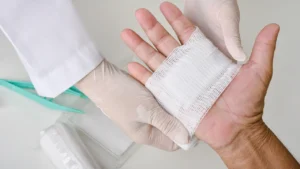TMJ dysfunction (TMD) is a condition that affects millions of people around the world, causing discomfort and pain in the jaw area. This disorder involves the temporomandibular joint (TMJ), which connects the jaw to the skull. TMJ dysfunction can range from mild discomfort to severe pain that interferes with daily activities such as eating, speaking, and even sleeping. Diagnosing and treating TMJ can be tricky, as its symptoms overlap with various other conditions, including Trigeminal Neuralgia and salivary gland disorders. Fortunately, a wide array of treatment options are available to alleviate the pain and improve quality of life.
Understanding TMJ Dysfunction
TMJ dysfunction refers to problems with the temporomandibular joint, which is responsible for the smooth movement of the jaw. This joint allows the jaw to open and close, enabling essential functions like speaking and chewing. When the TMJ becomes misaligned, irritated, or injured, it can lead to a condition known as TMD.
The causes of TMJ dysfunction are varied and often difficult to pinpoint. Factors like genetics, arthritis, jaw injury, and even poor posture can contribute to the development of this disorder. Other underlying conditions, such as Trigeminal Neuralgia or salivary gland disease, may present with similar symptoms, making diagnosis a bit more challenging. However, once identified, TMJ dysfunction can be managed with the appropriate treatments.
Common Symptoms of TMJ Dysfunction
The symptoms of TMJ dysfunction can vary greatly between individuals. Some people may experience mild discomfort, while others endure chronic pain. The most common symptoms of TMJ disorder include:
- Jaw pain: The most frequent symptom, especially around the TMJ and surrounding muscles.
- Lockjaw: The jaw may become “locked” in a closed or open position, making it difficult to move.
- Clicking or popping sounds: When opening or closing the mouth, you may hear clicking or popping sounds in the jaw.
- Muscle spasms: The muscles around the jaw may spasm, causing further discomfort.
- Difficulty chewing or speaking: In severe cases, the pain can make eating or speaking a challenge.
Symptoms may come and go, and for some, they can persist for months or even years. It’s important to note that while the pain is often temporary, it can significantly impact one’s day-to-day life.
How is TMJ Dysfunction Diagnosed?
Diagnosing TMJ dysfunction requires a comprehensive evaluation. Since there is no single test to confirm the disorder, healthcare providers often rely on a combination of physical examinations, medical history, and imaging tests. You may be referred to an otolaryngologist or a dentist who specializes in jaw disorders for further testing.
The physician will check for symptoms such as jaw tenderness, limited movement, or clicking sounds when opening the mouth. Imaging tests like X-rays, MRIs, or CT scans may be used to assess the structure of the jaw and determine if there’s any damage to the TMJ.
Because many of the symptoms of TMJ dysfunction overlap with other conditions, it’s crucial to rule out other possible causes, including Trigeminal Neuralgia, salivary gland issues, and swollen lymph nodes.
Non-Surgical Treatments for TMJ Dysfunction
The majority of TMJ dysfunction cases can be managed with non-surgical treatments. These conservative methods aim to reduce pain and inflammation while improving jaw function.
- Physical Therapy: Physical therapists often recommend jaw exercises and stretches to improve movement and reduce pain. Posture correction can also help reduce the strain on the TMJ.
- Splints or Mouth Guards: If jaw clenching or teeth grinding (often due to stress) is contributing to the pain, wearing a mouth guard or splint while sleeping can help. These devices help align the teeth and jaw, providing relief.
- Medications: Over-the-counter pain relievers, like ibuprofen or acetaminophen, can ease mild pain. Muscle relaxants may be prescribed to relieve spasms, while anti-inflammatory drugs reduce swelling.
- Heat and Cold Therapy: Applying warm compresses to the jaw can alleviate muscle tension, while cold packs can reduce inflammation and numb pain.
These treatments are typically effective for managing mild to moderate cases of TMJ dysfunction.
Advanced Treatment Options for TMJ Dysfunction
In more severe cases, where conservative treatments do not provide sufficient relief, more advanced treatment options may be necessary:
- Injections: Corticosteroid injections into the TMJ can reduce inflammation and pain. For some, Botox injections may also be used to relax the jaw muscles and reduce spasms.
- TMJ Surgery: In cases of significant joint damage or severe misalignment, surgical options like TMJ arthroscopy, joint realignment, or even joint replacement may be considered. Surgery is typically a last resort and is only recommended after other treatments have been exhausted.
- Alternative Therapies: Some patients benefit from complementary treatments like acupuncture or laser therapy, which can help alleviate pain and improve function.
Prevention Tips for TMJ Dysfunction
While not all cases of TMJ dysfunction can be prevented, there are several lifestyle changes that can help reduce the risk:
- Stress Management: Avoiding excessive stress can help prevent jaw clenching and teeth grinding, which often worsen TMJ symptoms.
- Posture Correction: Maintaining good posture, especially when sitting for long periods, can relieve pressure on the jaw and neck muscles.
- Avoiding Hard Foods: Chewing tough or chewy foods can strain the TMJ. Opt for softer foods to reduce stress on the joint.
- Regular Dental Checkups: Ensuring your teeth are properly aligned can prevent strain on the jaw muscles. A dentist can recommend treatments like bite adjustments if needed.
When to Seek Medical Attention for TMJ Dysfunction
If you experience persistent jaw pain, difficulty opening your mouth, or other symptoms of Tmj Dysfunction Treatment, it’s important to consult a healthcare professional. Early intervention can help prevent the condition from worsening and improve your chances of successful treatment.
- If symptoms persist for more than a few weeks or significantly interfere with daily activities, a consultation with a TMJ specialist is recommended.
- Severe cases, including lockjaw or intense muscle spasms, may require immediate medical attention.
Takeaway
TMJ dysfunction can cause significant discomfort, but the good news is that most cases can be managed with non-surgical treatments such as physical therapy, medications, and mouth guards. For more severe cases, advanced treatments like injections or surgery may be necessary. Early diagnosis and treatment are key to minimizing symptoms and improving quality of life.
If you’re experiencing symptoms of TMJ dysfunction, don’t wait to seek help. Schedule an appointment with a healthcare professional or TMJ specialist to explore treatment options that can bring you relief and restore your jaw function.






